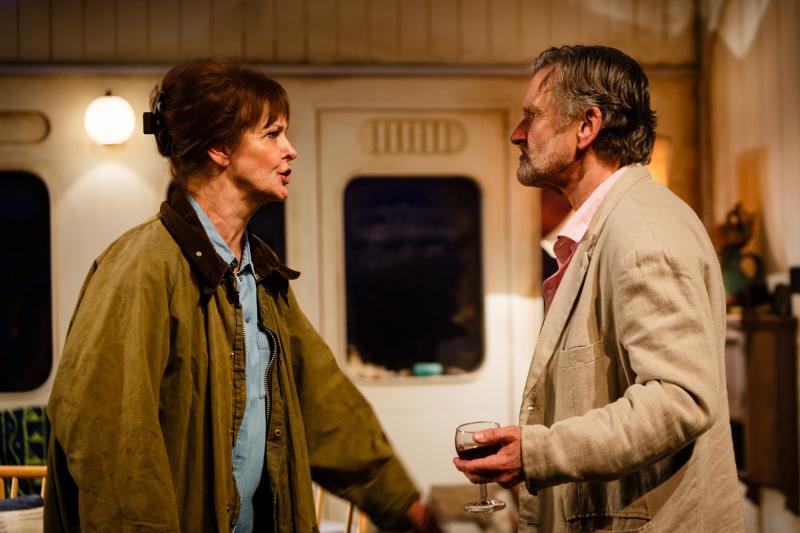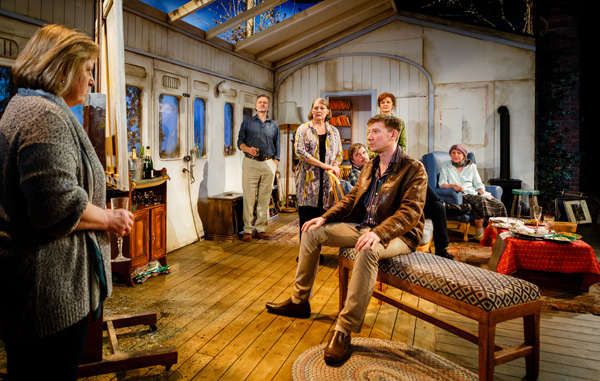After Electra, Tricycle Theatre | reviews, news & interviews
After Electra, Tricycle Theatre
After Electra, Tricycle Theatre
New black comedy about family life sparkles occasionally but rather unevenly

Some dramas begin with a brilliant idea. April De Angelis’s new black comedy, After Electra, is one of these. It starts with an audacious premise: the octogenarian artist Virgie is celebrating her birthday in her abode on the Essex coast, and invites family and close friends to join her. So far so normal. Then, as they assemble, she drops a bombshell. She tells them that she has decided to commit suicide.
How do Virgie’s guests react? Her fiftysomething daughter, Hadyn, ironically a bereavement counsellor, is exasperated; her unemployable son Orin arrives typically late. Her younger sister, Shirley, a member of the House of Lords, reacts sensibly and practically, and suggests calling the police, while her old friends – actor Tom and novelist Sonia – are confused and appalled. But Virgie, a survivor of the counterculture of the 1960s, can’t understand their resistance: “Why are we all so hung up about death?” she asks.
There is one genuinely shocking moment of violence
But the pains of old age are merely the rusty knife that opens up the play: it is principally a drama about family life. Both Hadyn and Orin were abandoned as children and their resentment is explored; as sisters, Virgie and Shirley compete in defining success in different ways: one is a happy ex-hippie, the other a high-flying bureaucrat. And while the marriage of Tom and Sonia is as spiky as a cactus, this couple’s mutual hatred binds them as close as any love.
The story’s title alerts us to expect echoes of the myth of Electra, the ancient Greek story of a daughter (Electra/Hadyn) who wreaks vengeance on her mother (Clytemnestra/Virgie), helped by her brother (Orestes/Orin). So there is another younger daughter who has been sacrificed in a family tragedy whose scars remain raw. With a epigraph from Sophocles – “Death isn’t the most hateful thing – worse is when someone wants to die but cannot” – the play has references to deep guilt, mentions of blood and tragic choices.
Incidents such as Virgie’s gift of the Oresteia to Tom sit a little awkwardly with more mundane points about marriage. Hate is shown to be a close kin to love; the individual’s right to self-fulfilment is asserted over parental duty; depression offers a drink to loose family bonds. Virgie thinks that the term “mother” is almost an insult: she sees herself as a person in her own right. At the same time, the plight of old people gets a sympathetic airing, and the question of their care results in one genuinely shocking moment of violence.
 In her youth, Virgie and her friends were countercultural activists – members of a hippie commune called the Republic of South Camden – and, just like Stephen Beresford’s The Last of the Haussmans, the play casts a sceptical eye on 1960s idealism. But although the criticisms of female roles is one of the play’s strengths, it is also a weakness: the attack on marriage is a bit relentless, and only fitfully funny. In general, there is a bit too much in this play, with late arrivals such as the eccentric cab driver and an old art pupil of Vergie’s simply adding to its sprawl.
In her youth, Virgie and her friends were countercultural activists – members of a hippie commune called the Republic of South Camden – and, just like Stephen Beresford’s The Last of the Haussmans, the play casts a sceptical eye on 1960s idealism. But although the criticisms of female roles is one of the play’s strengths, it is also a weakness: the attack on marriage is a bit relentless, and only fitfully funny. In general, there is a bit too much in this play, with late arrivals such as the eccentric cab driver and an old art pupil of Vergie’s simply adding to its sprawl.
Despite Samuel West’s empathetic production, and a cast (pictured above) which includes Marty Cruickshank (Virgie), Rachel Ball (Shirley), Veronica Roberts (Haydn), Kate Fahy (Sonia) and Neil McCaul (Tom), there are precious few hilarious lines that shoot up like rockets, and much of the dialogue is more squib-like. On the other hand, there are several moments of really good fun, including a spirited rendering of Nina Simone’s “Ain’t Got No Life”, a touch of poetry and some paintings described, a short bonanza of therapeutic drumming, and a lunch party from hell. But the evening rarely lives up to the high expectations of its opening.
rating
Buy
Share this article
The future of Arts Journalism
You can stop theartsdesk.com closing!
We urgently need financing to survive. Our fundraising drive has thus far raised £49,000 but we need to reach £100,000 or we will be forced to close. Please contribute here: https://gofund.me/c3f6033d
And if you can forward this information to anyone who might assist, we’d be grateful.

Subscribe to theartsdesk.com
Thank you for continuing to read our work on theartsdesk.com. For unlimited access to every article in its entirety, including our archive of more than 15,000 pieces, we're asking for £5 per month or £40 per year. We feel it's a very good deal, and hope you do too.
To take a subscription now simply click here.
And if you're looking for that extra gift for a friend or family member, why not treat them to a theartsdesk.com gift subscription?
more Theatre
 Little Brother, Soho Theatre review - light, bright but emotionally true
This Verity Bargate Award-winning dramedy is entertaining as well as thought provoking
Little Brother, Soho Theatre review - light, bright but emotionally true
This Verity Bargate Award-winning dramedy is entertaining as well as thought provoking
 The Maids, Donmar Warehouse review - vibrant cast lost in a spectacular-looking fever dream
Kip Williams revises Genet, with little gained in the update except eye-popping visuals
The Maids, Donmar Warehouse review - vibrant cast lost in a spectacular-looking fever dream
Kip Williams revises Genet, with little gained in the update except eye-popping visuals
 Ragdoll, Jermyn Street Theatre review - compelling and emotionally truthful
Katherine Moar returns with a Patty Hearst-inspired follow up to her debut hit 'Farm Hall'
Ragdoll, Jermyn Street Theatre review - compelling and emotionally truthful
Katherine Moar returns with a Patty Hearst-inspired follow up to her debut hit 'Farm Hall'
 Troilus and Cressida, Globe Theatre review - a 'problem play' with added problems
Raucous and carnivalesque, but also ugly and incomprehensible
Troilus and Cressida, Globe Theatre review - a 'problem play' with added problems
Raucous and carnivalesque, but also ugly and incomprehensible
 Clarkston, Trafalgar Theatre review - two lads on a road to nowhere
Netflix star, Joe Locke, is the selling point of a production that needs one
Clarkston, Trafalgar Theatre review - two lads on a road to nowhere
Netflix star, Joe Locke, is the selling point of a production that needs one
 Ghost Stories, Peacock Theatre review - spirited staging but short on scares
Impressive spectacle saves an ageing show in an unsuitable venue
Ghost Stories, Peacock Theatre review - spirited staging but short on scares
Impressive spectacle saves an ageing show in an unsuitable venue
 Hamlet, National Theatre review - turning tragedy to comedy is no joke
Hiran Abeyeskera’s childlike prince falls flat in a mixed production
Hamlet, National Theatre review - turning tragedy to comedy is no joke
Hiran Abeyeskera’s childlike prince falls flat in a mixed production
 Rohtko, Barbican review - postmodern meditation on fake and authentic art is less than the sum of its parts
Łukasz Twarkowski's production dazzles without illuminating
Rohtko, Barbican review - postmodern meditation on fake and authentic art is less than the sum of its parts
Łukasz Twarkowski's production dazzles without illuminating
 Lee, Park Theatre review - Lee Krasner looks back on her life as an artist
Informative and interesting, the play's format limits its potential
Lee, Park Theatre review - Lee Krasner looks back on her life as an artist
Informative and interesting, the play's format limits its potential
 Measure for Measure, RSC, Stratford review - 'problem play' has no problem with relevance
Shakespeare, in this adaptation, is at his most perceptive
Measure for Measure, RSC, Stratford review - 'problem play' has no problem with relevance
Shakespeare, in this adaptation, is at his most perceptive
 The Importance of Being Earnest, Noël Coward Theatre review - dazzling and delightful queer fest
West End transfer of National Theatre hit stars Stephen Fry and Olly Alexander
The Importance of Being Earnest, Noël Coward Theatre review - dazzling and delightful queer fest
West End transfer of National Theatre hit stars Stephen Fry and Olly Alexander
 Get Down Tonight, Charing Cross Theatre review - glitz and hits from the 70s
If you love the songs of KC and the Sunshine Band, Please Do Go!
Get Down Tonight, Charing Cross Theatre review - glitz and hits from the 70s
If you love the songs of KC and the Sunshine Band, Please Do Go!

Add comment